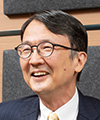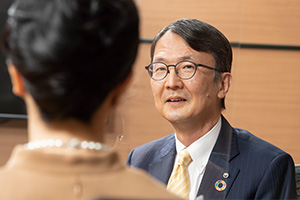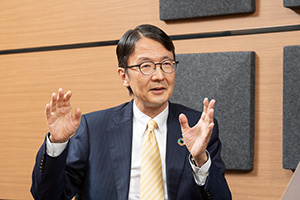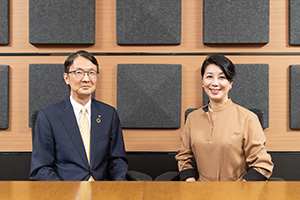 |
|
|
|
|
|
View from the Top Vol. 19, No. 12, pp. 1–5, Dec. 2021. https://doi.org/10.53829/ntr202112tp1
Treasure Every Encounter to Expand Your WorldOverviewNTT Anode Energy is promoting the smart energy solution business, which leverages the resources and information and communication technologies possessed by the NTT Group. Two years after its establishment, the company is striving to contribute to resolving social issues, such as environmental and population problems, revitalizing industry, and building a sustainable society. We interviewed Toru Takama, president and chief executive officer of NTT Anode Energy, about the progress of business to promote and expand renewable energy and the mindset of top management. Keywords: renewable energy, carbon neutrality, power purchase agreement Expand sales by developing renewable energy sources and promote smart grids—NTT’s new environment and energy vision “NTT Green Innovation toward 2040” is exactly where NTT Anode Energy will play an active role. In September 2021, NTT announced a new environment and energy vision called “NTT Green Innovation toward 2040” to simultaneously achieve the contradictory objectives of “zero environmental load” and “economic growth” by reducing environmental load due to business activities and creating breakthrough innovation. This vision states two goals: the first is an 80% reduction in greenhouse-gas emissions by the NTT Group (compared to FY2013) and carbon neutrality for the mobile (NTT DOCOMO) and datacenter sectors by FY2030, and the second is carbon neutrality for the NTT Group by FY2040. NTT Anode Energy is playing a role in achieving these goals through business development on the basis of two pillars: (i) developing renewable energy sources and expanding sales and (ii) promoting local generation for local consumption of energy, centering on “Battery Farms.” Since the establishment of the company, we have been focusing on developing green power as a renewable energy source. In addition to constructing and installing green power plants, we provide green power to companies that recognize the value of renewable energy. We will supply green power to DOCOMO Denki, a retail electricity service scheduled to be launched in March 2022. The supply of green power requires storage batteries to store surplus power from green power plants and to supply power when the amount of power being generated drops. Accordingly, we are establishing Battery Farms, an environment in which green power plants can be easily connected to power-transmission and distribution networks by installing storage batteries in approximately 7300 of NTT Group’s telecommunication buildings scattered across Japan. We began providing green power to stores such as Seven & i Holdings Co., Ltd.’s convenience stores through Japan’s first off-site power purchase agreements (PPAs). Under off-site PPAs, power is supplied to the customer’s facilities from power-generation facilities installed in remote locations through power-transmission and distribution networks. We also provide green power to Daiichi Sankyo Chemical Pharma Co., Ltd. and Furukawa Electric Co., Ltd. through on-site PPAs under which power is supplied from solar-power generation equipment, etc. installed next to the customer’s facilities. —What specific action will be taken within the NTT Group to achieve this vision? The NTT Group currently uses just over 1% of the electricity consumed in Japan. I believe that our efforts to transform this 1% into green power are of great social significance. If NTT Group’s electricity consumption follows its current trend, it is projected to double by FY2040 compared to FY2013. Therefore, “NTT Green Innovation toward 2040” presents a vision of achieving decarbonization and carbon neutrality of the NTT Group by FY2040 by cutting power consumption in half and converting it into renewable energy through implementing the Innovative Optical and Wireless Network (IOWN) and energy saving. Conventional energy systems have typically been centralized systems; that is, power generated at large power plants is delivered to points of consumption via power-transmission and distribution networks. In contrast, energy systems from now on will be distributed systems. NTT Anode Energy plans to construct a distributed energy system by using NTT Group’s telecommunication buildings across Japan as Battery Farms to provide locally generated renewable energy for local consumption. This system will reduce electricity loss due to long-distance power transmission and distribution and enable more efficient use of energy by, for example, controlling the power supply in accordance with supply-and-demand conditions. The construction and rapid development of Battery Farms and power plants is our highest priority.
How to seize opportunities during challenging situations—Have you had anything to do with energy in your past work? My position at NTT Anode Energy is my first energy-related job. I joined Nippon Telegraph and Telephone Public Corporation (now NTT) in 1981, and for 26 years starting my second year there, I have led a challenging corporate life during which I have taken on work without any briefing or handover; in other words, I have always been assigned to projects new to NTT. After completing my training period, I was assigned to a technology development department related to transmission and took charge of digital-transmission technology. At that time, telecommunication networks were being digitized, and a very accurate digital clock was needed to ensure that entire networks operated in synchronization. To meet this need, we developed the “D2 standard-clock generator,” which became Japan’s standard clock. (The actual device is on display at the NTT History Center of Technologies in Tokyo.) Since then, I have worked in fields such as product development, global affairs, technology development, and software development, but NTT Anode Energy is my first job in the energy field. However, most of the work I have experienced thus far has been characterized by taking new steps, such as starting new projects or joining new organizations, and the energy field is the same in the sense of being new to NTT. Among my experiences, one that left a particularly strong impression on me was working at the World Bank in Washington, D.C. beginning in 1987 for three and a half years, where I served as a professional in charge of loan appraisal and supervision of telecommunication projects in Indonesia and Bangladesh. The World Bank has nothing to do with technological development. I arrived in Washington, D.C. on a Sunday, and since I had just arrived, I had neither found a house to live in nor other living arrangements. The next day, Monday, on greeting my boss for the first time, I was given a document of about 150 pages and told, “Tomorrow, you will attend a meeting on behalf of our section and write a report on it.” I had hoped to be able to get my life together before I started work, but that hope was dashed. Although I had studied in France before, this was my first time in an English speaking country. On top of that, my boss at the time was Indian, and I had difficulty in understanding his heavy Indian accent. The theme of the meeting that I attended was, naturally, finance, and the conversation was filled with banking terminology in English. As an engineer, I didn’t know such banking jargon, so I couldn’t write the expected report. As a result, I spent nine months in a private room without being given any work.
—That’s a tough situation. How did you overcome that? First, I made an effort to brush up on my English by studying at a business school and earned an MBA (master of business administration) at night school. At the World Bank, professionals have their own offices without having meetings or document exchanges, so I had no way of knowing what was going on in my own section. Therefore, I invited colleagues of my section to lunch to find out what was going on and ask if there was any work I could do. As the World Bank was a competitive workplace, they wouldn’t talk about good jobs with me. Occasionally, some people told me they had a job for me, but it was either very challenging or unpleasant. However, it was better than no work for me, so I volunteered for such a challenging job. Since I didn’t have the capability to carry it out, I invited other colleagues to lunch and asked them how to do the job. As I repeated this process over and over, I was able to receive help from different people and finally and fortunately was assigned to telecommunication projects in Bangladesh and Indonesia after nine months. The World Bank is an organization with full of senior professionals. One of the chief economists at that time was Lawrence Summers. Later he became the U.S. Secretary of the Treasury in 1999 and the president of Harvard University in 2001. I worked with former Managing Director of Sri Lankan Telecom, and my boss with the heavy accent was the former Managing Director of Indian Development Bank. Looking back, I was fortunate to have opportunities to meet these people. It was also during that time that I met one of the founders of Apple, Mike Markkula. Later, in 1995, I happened to be a member of the joint project between NTT and Apple. During the project, we developed and commercialized a system called Desktop Communication Conference System FM-A71, which had almost identical functionalities to today’s web conferencing systems, allowing users to share images during a conference call. Web conferencing is now used for remote work as a matter of course; however, back then, the Internet was not yet widespread, and our system required an ISDN connection (integrated services digital network). Even though it did not sell well, in retrospect, I think our efforts were pioneering.
Results will always emerge over time—Are there any moments when you feel that the work you have done thus far has made a difference in your current position? NTT’s electric-power business has a shorter history than its telecommunication business. As I mentioned earlier, I have many experiences of starting new businesses from scratch, so I think I am used to challenging situations. Even if you face a big decision or a fork in the road in regard to the job at hand, it may not be such a big issue if you look at it from a wider perspective. I believe that we should work on one thing at a time and not rush things, because results will surely come as time goes by. However, some things must be addressed immediately. For example, investment in Battery Farms and power plants that enable local generation and local consumption of energy is needed right now. I think that my past experiences in investing in overseas companies has come in handy in that regard. I have learned from past experiences two things that are important to me in top management. One is communication, and the other is “ichi-go ichi-e,” which means treasure every encounter, for it will never recur. I have thus far managed to overcome difficulties thanks to the help of many people and cherish the many encounters I have had. Thanks to them, I am now able to do the job I do today. In addition to these two points, in top management you must have the ability to execute plans, make decisions, and make judgments. It is important to listen carefully to the opinions of others, including employees, and once you have made a decision, try your best to carry it out or call it off if you find that the decision is not working. For that reason, I listen to people a lot. This is because many clues can be found by listening to people. It is also obvious that there are limits to what one person can think and do alone. Therefore, it is crucial to create an environment in which people support each other. This environment cannot be created without good communication. —Communication is also important for engineers and researchers to flourish. What is your advice to them? I have always valued communication—both internally and externally. I invite employees to lunch to create a place for communication, and I have been holding quarterly group discussions with employees for the past 20 years. Setting a theme and discussing it creates a variety of ideas, and in a number of cases, those ideas have become reality. Outside the company, a study group that I launched 38 years ago is still going, and a total of 800 people are registered. It is held once a month, and each session has 20 to 30 participants. I try to make the most of every moment I get to meet each of the members who attend the study sessions. This accumulation of encounters leads to work and connections that expand my world, and I am grateful that it does. When I was head of the Advanced IP Architecture Center at NTT Communications, a technology-development organization, I set up an open lab for co-creating with venture companies by offering NTT Communications’ cloud services and mentoring for free for six months. We started this project to support as many entrepreneurs as possible, and although it did not directly benefit the NTT Group, some of the organizations that used it are now successful companies. Also, when I was working at Verio, a US Internet and web hosting company, I learned about the benefits of the open-source model from their business. I have been creating settings that lead to such open innovation in Japan and abroad as well as promoting initiatives to energize engineers. I hope that engineers will appreciate the importance of communication with various people and keep challenging themselves. I also hope that researchers in the software field will communicate with their outstanding engineering colleagues and work on many interesting projects together. Interviewee profileCareer highlightsToru Takama joined Nippon Telegraph and Telephone Public Corporation (now NTT) in 1981. After being seconded to the World Bank and Verio Inc. he had served as President of the Advanced IP Architecture Center of NTT Communications, member of the Board of NTT COMWARE, and Executive Vice President of NTT TechnoCross. He has been in his current position since June 2020. |
|












